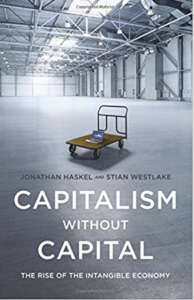
Exploiting the spill overs of other people’s intangible investments


This book reveals for the first time how advanced economies invest more in intangibles – design, branding, research and development, software – than in physical assets. Jonathan Haskell of Imperial College and UK government adviser Stian Westlake of Nesta, both co-winners of the 2017 Indigo Prize, make an un disputable challenges for businesses and public policy. They also describe why governments need to count innovation as an engine of profit. The rise of intangible investment is under appreciated cause phenomena from economic inequality to stagnating productivity. Their decade of research show how to measure intangible investment and its impact on national accounts, showing the amount different countries invest in intangibles, and the unusual characteristics of intangible investment, contribute to an intangible-rich economy which is fundamentally different from one based on tangibles.
For all sorts of businesses, from tech firms, coffee shops, gyms and pharma companies, the ability to deploy assets that one can neither see nor touch is increasingly the main source of long-term success. The rise of the intangible investment is, an under appreciated cause of phenomena from economic inequality to stagnating productivity.
The economies of the old, were founded on things that were actually manufactured and grown and the idea that the economy night come to depend on things that were immaterial was an old one. We lack ability to measure certain aspects of Microsoft, whose market value a decade ago was $250 billion, but its physical basis, the value of its properties and equipment was only about 1 per cent of that. This shift to intangible investment has widespread consequences, as it plays out long-term inequality, infrastructure development and taxation. It furthers secular stagnation, by allowing scalable firms to emerge that engulf and overpower competitors, as opposed to enhancing an economy based on the “spill over effects’ of a high tide that rises all boats. In a closed economy, investing becomes more challenging, as does corporate financing,
Over the last few years the capital stock of the economy in the UK and the US and other rich countries has become less dependent on tangible assets like factories, lorries or office buildings and more on intangible assets like R&D, software, brands and designs. This is function of economic growth, technological progress like IT, which makes intangibles more useful, and underlying forces like Baumol’s cost disease since tangible assets are often manufactured their cost will tend to fall quicker than intangibles which are result of service activities. The benefit of intangible investment don’t always accrue to the business that makes it. It is like how Xerox developed computers with Graphical User Interface but Apple, IBM and then Microsoft ended up make all the money. Exploiting the spill overs of other people’s intangible investments is what business school types call “Open innovation”.
Large synergies with other intangibles like range of ideas and deals from Jony Ive’s design to the iOS software to the plans for the App Store and deals with mobile carriers led to the hugely successful iPhone. It is a world that rewards workers with a roving eye, who like seizing one new opportunities. It is a world where the ability to make sense of abstract concepts to argue and enforce claims will be rewarded. There is a secular change underway in the economy that rewards cosmopolitan values and penalises traditional ones,
The authors present three possible scenarios for what the future of an intangible world might be like, and by outlining how managers, investors, and policymakers, can exploit the characteristics of an intangible age to grow their business, portfolios and economies.
Capitalism without Capital shows that the growing importance of intangible assets has also played a important role in some of the big economic changes of the last decade.
Capitalism without Capital: The Rise of the Intangible Economy by Jonathan Haskel and Stian Westlake, Princeton University Press £24.95/$29.95.

